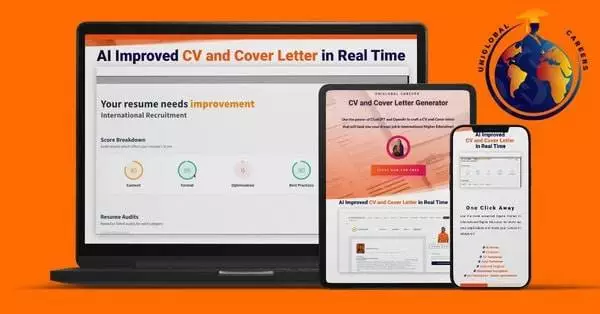In today’s globalized job market, having a competitive CV is essential for landing your dream job in international education. Whether you’re a recent graduate looking for your first job or a seasoned professional seeking new challenges overseas, it’s crucial to tailor your CV to stand out in a sea of applicants. In this article, we’ll explore top tips and strategies for optimizing your CV for international education, so you can increase your chances of success.
Making the Most of Your International Experiences
Studying abroad or working in a foreign country can be a life-changing experience, offering you the opportunity to gain new perspectives, broaden your horizons, and develop a range of valuable skills. Whether you’re studying, volunteering, or interning overseas, it’s important to make the most of your international experiences and use them to your advantage as you pursue your career goals.
One of the most significant benefits of international education is the chance to gain diverse experiences that can set you apart from other candidates. When crafting your CV, be sure to highlight any international experiences you’ve had. For example, if you studied abroad, mention the country you visited, the courses you took, and the skills you gained. If you worked overseas, describe the job you held, the challenges you faced, and the accomplishments you achieved.
It’s also important to explain how your international experiences have prepared you for a career in international education. For instance, if you studied abroad, you might discuss how you developed cross-cultural communication skills, adapted to a new academic environment, or gained a deeper understanding of global issues. If you worked overseas, you might highlight how you learned to navigate cultural differences, work effectively in a team, or solve problems in a fast-paced, dynamic setting.
Another key aspect of international education is cultural sensitivity and awareness. When working in a foreign country, it’s essential to understand and respect local customs, traditions, and values. By demonstrating your cross-cultural experiences in your CV, you can show potential employers that you have the skills needed to work effectively in a global context. For example, you might describe how you adapted to different communication styles, learned to appreciate diverse perspectives, or developed a deeper understanding of cultural differences.
In conclusion, international education can be a valuable asset to your career, providing you with a range of experiences and skills that can set you apart from other candidates. By highlighting your international experiences and demonstrating your cultural sensitivity and awareness, you can showcase your strengths and make a compelling case for your candidacy in the field of international education.
Diversifying Your CV for Global Employers
When it comes to finding a job in today’s global marketplace, having a diversified CV is more important than ever. International employers are seeking candidates who bring a range of skills and experiences to the table, and are often looking for individuals who can adapt to new environments and work effectively with people from different backgrounds.
If you want to stand out from other applicants, consider diversifying your CV in terms of both content and format. For example, you might include sections on your language skills, cross-cultural experiences, and experience working in diverse teams. Highlighting these aspects of your experience can help demonstrate your ability to work effectively in a global context, and can make you a more attractive candidate to international employers.
In addition to diversifying your content, consider using a creative format to make your CV more visually appealing. This could mean using infographics, incorporating images, or organizing your information in an unconventional way. However, it is important to remember that your format should be professional and easy to read, so you don’t detract from the content of your CV.

One way to diversify your CV is to highlight your language skills. If you are fluent in multiple languages, consider creating a separate section of your CV that lists your language proficiency. This can help demonstrate your ability to communicate effectively with people from different cultures, and can also make you a more attractive candidate for international positions.
Another way to diversify your CV is to highlight your cross-cultural experiences. If you have lived or worked in different countries, or have experience working with people from different cultures, be sure to highlight this in your CV. This can help demonstrate your ability to adapt to new environments and work effectively with people from different backgrounds, which is a valuable skill in today’s global marketplace.
Finally, consider highlighting your experience working in diverse teams. Many international employers are looking for candidates who can collaborate effectively with people from different backgrounds and perspectives. If you have experience working in diverse teams, be sure to highlight this in your CV. This can help demonstrate your ability to work effectively in a global context, and can make you a more attractive candidate for international positions.
By diversifying your CV in terms of both content and format, you can make yourself a more attractive candidate to international employers. Highlighting your language skills, cross-cultural experiences, and experience working in diverse teams can help demonstrate your ability to work effectively in a global context, and can make you stand out from other applicants. So if you’re looking to take your career to the next level, consider diversifying your CV today!
When it comes to showcasing your cultural competencies, it’s important to go beyond just listing your language skills or international experiences. Employers want to see how you’ve put those skills into practice and how they can benefit their organization.One way to demonstrate your cross-cultural communication ability is by giving examples of how you’ve successfully navigated cultural differences in the workplace. This could include adapting your communication style to better fit the cultural norms of your colleagues or clients, or finding creative solutions to cross-cultural misunderstandings.If you have expertise in international education systems, you could highlight how this knowledge has helped you in your previous roles. For example, if you’ve worked in a school or university setting, you could talk about how you’ve helped international students navigate the education system and feel more comfortable in a new environment.Another way to showcase your cultural competencies is by discussing your personal values and how they align with the values of the organization you’re applying to. This demonstrates that you have a deep understanding of the cultural nuances of different countries and can adapt to different organizational cultures. For example, if you’re applying to a company that values teamwork and collaboration, you could talk about how your experiences working in diverse teams have helped you develop those skills.Ultimately, showcasing your cultural competencies is about demonstrating your ability to work effectively in a globalized world. By highlighting your language skills, cross-cultural communication ability, and knowledge of international education systems, you can show potential employers that you have the skills and experience they’re looking for in a global candidate.
Utilizing Creative Formats to Stand Out
When it comes to job hunting, standing out from the competition is crucial. One way to do this is by utilizing creative formats in your CV. However, it’s important to note that there’s a fine line between creativity and unprofessionalism. You want your CV to be visually appealing, but you also want to ensure that it’s easy to read and understand.
A great way to strike this balance is by using headings, subheadings, and bullet points to break up your text. This not only makes your CV more scannable for potential employers, but it also adds a level of organization and professionalism. Additionally, using a legible font and an appropriate font size is key. You don’t want your CV to be too small or too large, as this can make it difficult to read.

Another way to add some creativity to your CV is by incorporating color. However, it’s important to use color sparingly and strategically. Stick to one or two accent colors and use them consistently throughout your CV. This can help draw attention to important information and make your CV stand out from others.
Remember, your CV is a representation of yourself and your skills. A well-organized and visually appealing CV can make a great first impression on potential employers and increase your chances of getting hired. So don’t be afraid to get creative, but always keep professionalism in mind.
Highlighting Your Language Skills
In today’s globalized job market, language skills are highly valued by international employers. If you’re fluent in multiple languages, be sure to include this information on your CV. You might also include any language certifications you’ve earned, such as the TOEFL or the DELE.
Being bilingual or multilingual can give you a competitive edge in the job market. Speaking another language fluently can help you communicate with clients, customers, and colleagues who speak that language. It can also help you navigate cultural differences and build stronger relationships with people from different backgrounds.
In addition to listing your language skills, be sure to give examples of how you’ve used these skills in past roles. This could include translating documents, facilitating cross-cultural communication, or teaching language classes. For example, if you worked as a customer service representative for a company that had clients from different countries, you might have used your language skills to communicate with those clients and ensure that their needs were met.
Demonstrating how you’ve leveraged your language skills in real-world situations can set you apart from other candidates. It shows that you not only have the ability to speak another language, but that you also have the practical experience to use that language in a professional setting. This can be particularly valuable for jobs that require frequent communication with people from different countries or cultures.
It’s also worth noting that language skills can be developed and improved over time. If you’re not currently fluent in another language, consider taking classes or using language-learning apps to improve your skills. This can be a valuable investment in your career, as it can open up new opportunities and make you a more competitive candidate in the job market.
Tailoring Your CV for Different Countries
When applying for jobs in different countries, it’s important to tailor your CV to the specific requirements of the job market. This could mean using different formats, highlighting different experiences or skills, or including information that’s specific to the country you’re applying to.For example, if you’re applying to a job in China, you might include information on your knowledge of Chinese culture and history. If you’re applying to a job in the Middle East, you might highlight your experience working in multicultural teams and your knowledge of Islamic customs. Tailoring your CV to the specific needs of the employer can show that you’ve done your research and are serious about the job.

Optimizing Your CV for Online Applications
Many international employers use online applications to screen candidates, so it’s important to optimize your CV for this format. This means using keywords and phrases that are relevant to the job, so that your CV will be picked up by automated filters.It also means formatting your CV in a way that’s easily scannable by humans and machines alike. Use headings, subheadings, and bullet points to break up your text, and be sure to include your contact information at the top of your CV. Keeping your CV concise and relevant can help you get noticed in a crowded online application pool. Make sure to use our Resume Assistant to ensure you craft a perfect application.
Crafting an Attention-Grabbing CV Summary
Your CV summary is often the first thing a potential employer will read, so it’s important to make it attention-grabbing and relevant. Summarize your key skills, experiences, and accomplishments in a way that’s concise and compelling.One way to make your CV summary stand out is to use data or statistics to demonstrate your impact in previous roles. For example, you might say “Increased student retention rates by 20% through implementing a new mentoring program.” This shows potential employers that you’re results-oriented and can back up your claims with hard data.
Strategies for Applying to International Job Markets
When applying to international job markets, it can be helpful to network with professionals in the field and attend career fairs or conferences. Joining professional organizations and engaging with industry groups can also help you stay up-to-date on the latest trends and best practices. Another strategy is to research the requirements for different countries and industries, so you can tailor your CV and application materials accordingly. If possible, try to gain experience working in the country or region you’re interested in, so you can demonstrate your knowledge of the local culture and customs.

Strategies for Showcasing Your Global Perspective
Finally, it’s important to showcase your global perspective in all aspects of your job search. This means demonstrating your adaptability, cross-cultural communication skills, and knowledge of international education systems.In addition to highlighting your international experiences and language skills, be sure to give examples of how you’ve worked with diverse teams and adapted to different environments. This can show potential employers that you have the skills needed to thrive in a global context and can contribute to their organization’s success.
Conclusion
Crafting a winning CV for international education requires a strategic approach that highlights your unique skills and experiences. Whether you’re a recent graduate or a seasoned professional, using the tips and strategies outlined in this article can help you stand out in a crowded job market and land your dream job abroad.


